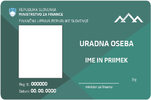Visits by officials of the Financial Administration
Event description
Areas of supervision by the Financial Administration of the Republic of Slovenia

The Financial Administration of the Republic of Slovenia (hereinafter: FURS) supervisions the lawful, correct and timely implementation of tax and customs regulations as well as other areas within its competence.
FURS conducts supervision in the following areas:
- various forms of taxation (corporate income tax, tax on income from self-employment, value added tax, income tax, etc.);
- transfer pricing;
- other charges (social security contributions, etc.);
- customs duties (duties in import, export, transit and the transfer of goods in accordance with customs regulations), excise duties and environmental taxes;
- undeclared work and employment;
- gaming;
- fiscal cash registers;
- implementation of the Prevention of Late Payments Act;
- implementation of the Prevention of Money Laundering and Terrorist Financing Act- ZPPDFT-1;
- the Common Agricultural Policy and implementation of the Forest Act;
- the implementation of regulations determining special measures for the purpose of security, the protection of human, animal and plant health, the protection of the environment, cultural heritage protection, the protection of intellectual property rights, etc.
Types of financial supervision conducted by FURS
FURS carries out the following types of financial supervision:
- supervision of tax returns (supervision of compliance with the obligation to file tax returns and supervision of tax returns filed);
- tax supervision of individual areas of operation (only for a specific area of operation);
- tax audit (includes two or more areas of operation and/or two or more taxes for one or more tax periods);
- financial investigations (with a view to preventing, investigating and identifying serious breaches of regulations);
- other types of supervision within the competence of FURS.
Criteria for supervision conducted by FURS
Financial supervision is carried out in accordance with objective criteria and the principle of the balanced supervision of all liable persons, with priority being given to entities with a major risk of improper compliance with tax liabilities. Particular emphasis is placed on areas in which violations of employees' rights have been identified and areas with a larger share of the grey economy. The objective criteria have been prepared on the basis of a risk analysis. Supervision is partly carried out by using the random selection method.
How do taxable persons know that financial supervision will be performed by authorised FURS officials?
Officials perform the tasks of the Financial Administration in uniform or in plain clothes. When officials perform their duties in plain clothes, they must prove their identity with a service ID card.
FURS officials with special powers to conduct supervision
FURS officials with special powers to conduct supervision include inspectors, customs officers, investigators and controllers.
The powers of officials
In the conduct of their duties, FURS officials:
- establish a taxable person’s identity and status;
- gather and obtain information and data;
- request the submission of data, documents and other records and safeguard data;
- use technical devices for photographing or video recording;
- take and examine samples of goods;
- check the intended use of marked energy products and the content of dye markers in fuels;
- seize documents, database carriers, etc.;
- access and examine land, premises and facilities;
- check devices, goods, etc.;
- stop means of transport;
- check and examine means of transport and means of transfer;
- carry out security searches;
- examine persons;
- use coercive measures;
- prohibit the performance of an activity and seal off business premises, books of account and other documents;
- use technical equipment, official files, service dogs, and official vehicles with right of way;
- detain perpetrators;
- perform other actions in line with the purpose of performing the tasks of the Financial Administration.
Measures carried out by officials
On the basis of the findings of financial supervision, officials may perform a variety of actions: issue notices of assessment, initiate minor offence proceedings, prohibit the performance of activities, seal off business premises and websites, and refer a case to a competent authority (in the event of suspicion that a criminal offence has been committed).
FURS informs taxable persons of the areas in which irregularities have been found and invites them to make a self-declaration. As a result, taxable persons are increasingly opting for self-declaration and voluntarily settle their outstanding liabilities in order to avoid a penalty for tax offences.
The place and time of financial supervision
Financial supervision can be performed:
- on the business premises of taxable persons,
- in the field;
- on the business premises of the financial authority.
Financial supervision is generally carried out during business hours. Financial supervision may also be performed outside business hours when this is necessary for the purpose of financial supervision.
Tax audit
Tax audit includes supervision of compliance with the law in order to determine whether charges have been imposed and paid correctly and promptly.
Tax audit generally begins by serving a decision to initiate the tax audit procedure. A tax inspector (hereinafter: inspector) may commence a tax audit after the expiry of eight days following service of the decision. If the purpose of a tax audit is otherwise at risk, such tax audit procedure may begin without the issuance of a decision and the tax inspector may carry out any inspection-related activity.
Upon the completion of a tax audit, the inspector draws up a record and hands it to the taxable person concerned. The record shall include a description of the established situation and all facts and circumstances relevant to the decision. The taxable person concerned may comment on the record within no later than 20 days of service (within 30 days in the event of customs matters).
If the taxable person's comments on the record relate to new facts and evidence that existed before the record was drafted and the taxable person could not have provided such on justified grounds, the tax inspector issues a supplementary record. If no comments on the (supplementary) record are received from the taxable person or if the comments do not relate to new facts or evidence, the tax inspector issues a decision. An appeal may be submitted against a decision within 30 days of the service thereof.
If no irregularities are established during the procedure, the tax inspector issues a decision to stay the procedure. In the event of the non-payment of a tax liability, FURS proceeds to tax enforcement.
A simplified description of the tax audit procedure
The inspection of tax returns and individual areas of activity follows a procedure that is similar to tax audit with the difference that it is a slightly simplified supervision procedure for which no decision needs to be issued and that has shorter procedural deadlines (such as that comments on the record should be submitted within 10 days of the service of the record). Taxable persons can still conduct the option of self-declaration in the framework of such supervision procedures.
The period subject to tax audit
For legal persons other than large companies and for self-employed individuals, tax audit shall include no more than three preceding tax periods.
Tax audit may also be extended to other periods or other tax types if there is a suspicion of decreased tax liability due to the non-payment of tax.
The rights and duties of taxable persons subject to tax audit
A taxable person has the right and duty to cooperate in determining the actual situation relevant to decision-making in the financial supervision process. A taxable person must provide information, books of account and records, business documents and other documents, as well as any necessary explanations. It is the taxable person's duty to respond to the inspector's invitation; otherwise, the taxable person may be summoned by force.
Other rights of taxable persons include:
- The right to be present during the supervision procedure and to be regularly updated on important facts established during the procedure, unless this interferes with the procedure.
- The right be reminded of the right to appoint a person responsible for providing information and further details.
- The right to have an expert to provide clarifications and advice – e.g. a tax consultant.

Did you know?
If taxable persons remedy irregularities by means of a self-declaration or submit a tax return or a corrected tax return before the start of tax audit:
- they are charged a lower interest rate on the additionally established liabilities,
- receive no sanctions for the minor offence.
Taxable persons may submit a tax return in the form of a self-declaration or an amended tax return no later than by the commencement of a tax audit or service of a notice of assessment or the commencement of minor offence or criminal proceedings. In such case, no sanction is imposed for the minor offence and interest is charged at a rate of 3%, which is lower than the additionally established liabilities.
The new provision of Article 140 of the Tax Procedure Act: Taxable persons shall be given the opportunity to submit their tax returns or corrected tax returns in a tax audit procedure within 20 days of the service of the record. Upon the submission of the tax return they must pay the amount of tax determined in the attached tax return or the corrected tax return, plus interest from the date of the expiry of the time limit for payment until the date of the submission of the tax return or the corrected tax return at a fixed interest rate of 5% p.a. In such case, the tax audit procedure is suspended by a decision and the taxable person is not held responsible for committing a tax offence.
When FURS establishes a tax liability during a supervision procedure it issues an assessment notice or applies a higher, 7% p.a., interest rate.

Notice
No appeal is allowed against a decision to commence a tax audit procedure.




